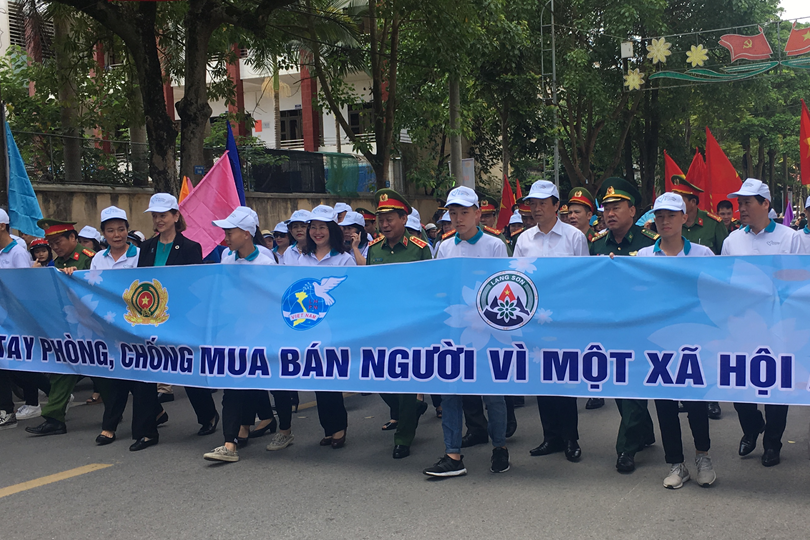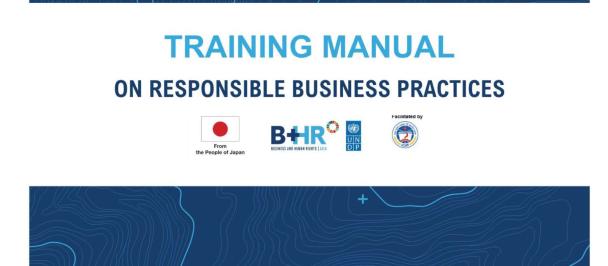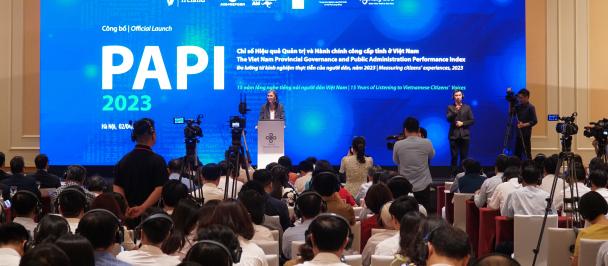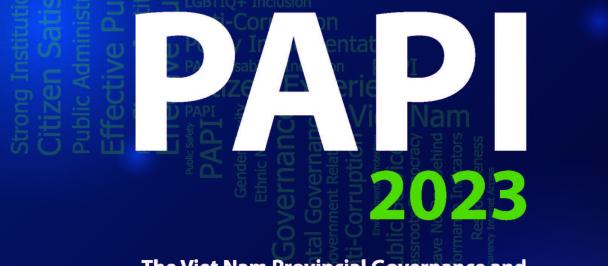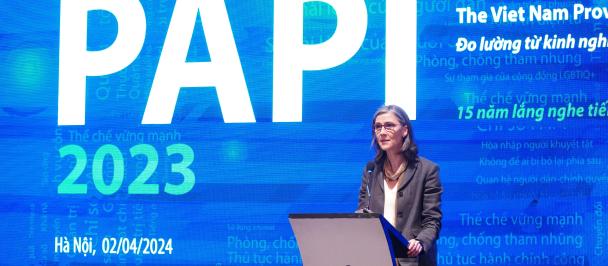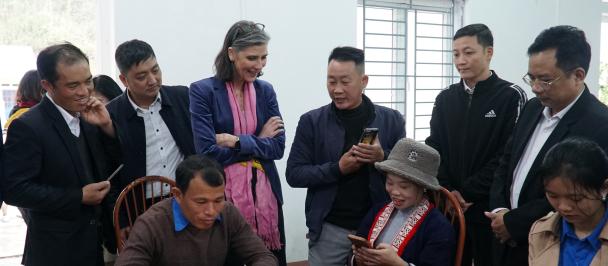Speech by UNDP Resident Representative Caitlin Wiesen at the national commemoration in Lang Son border province
World Day against Trafficking in Persons
July 30, 2019
Mme. Lam Thi Phuong Thanh, Member of Central Party Executive Board, Lang Son Provincial Secretary
Sr. Lieu. Gen. Le Quy Vuong, Vice Minister of Ministry of Public Security;
Mme. Nguyen Thi Thu Ha, President of Vietnam Women’s Union;
Mr. Pham Ngoc Thuong, Chairperson of Lang Son provincial People’s Committee;
Representatives from ministries and provinces, colleagues from UN agencies, Embassies, and CSOs;
Distinguished guests, ladies and gentlemen
Good morning, Xin Cao!
At the outset, I would like to thank Sr. Lieu. Gen. Le Quy Vuong, Mme. Nguyen Thi Thu Ha and leaders of Lang Son province for organizing this significant event to commemorate the National Day against Trafficking in Persons in Lang Son province.
I am honored to join this important event on the critical issue of trafficking in persons taking place in Lang Son province.
I would also like to thank our Government partners from MPS, MOLISA, the Vietnam Women’s Union, the Border Guards at both central and provincial level and all other relevant partners from other ministries, as well as representatives from 22 provinces and international development partners for joining the event today. Your presence today reaffirms our shared vision of “ending trafficking in persons”, and our shared commitment to work together to make it happen.
Ladies and Gentlemen,
Human trafficking is an increasingly important development issue in Vietnam, especially with new trends and means used by traffickers, affecting increasingly younger students and even urban children (as we saw in the video). It affects Viet Nam’s hard-earned socio-economic gains, and harms the lives of individuals and families, particularly those who are marginalized and poor. More than 80% of reported trafficking cases in Vietnam are cross-border in nature, involving countries such as Cambodia, Korea, China, Taiwan, China, Malaysia, and regions including Europe and the Middle East. An estimated 85% of the cases of trafficking from Vietnam are to China and mainly for purposes of labour and sexual exploitation, forced marriages, and surrogacy.
Lang Son, among other provinces, shares a border with China of over 200km (as we heard this morning), with active cross-border exchanges, facilitating trade, but also facilitating trafficking of persons. It is also a hotspot area of human trafficking in Viet Nam. The traffickers make use of long border of more than 231km with two international border gates, one main border gate and 9 sub-one plus many other unofficial crossings between the two countries making the situation of human trafficking in Lang Son more complex.
The government and all other stakeholders have long recognized the severity of the problem and efforts over the years have raised awareness and led to some successes in combating human trafficking. However, despite progress made, and the efforts of the Government of Vietnam, UN agencies, international organizations, development partners and civil society, trafficking in persons remains complex and persistent, affecting Viet Nam’s progress in sustainable development across all of the Sustainable Development Goals (SDGs). In particular, human trafficking poses a direct barrier to achieving targets under SDGs 5 (gender equality), SDG 8 (decent work and economic growth), SDG 10 (reduced inequality), SDG 16 (peace, justice and strong institutions), and SDG 17 (partnership for the goals).
We at UNDP in partnership with other UN family agencies notably IOM, UN Women and ILO are honored to be a close and trusted partner of Viet Nam in its fight against trafficking in persons. Allow me to highlight some of UNDP’s work in trafficking. We are supporting the Government to: (i) develop a National Referral Mechanism to support trafficked persons (or NRM); and (ii) support interventions around the 4P approach (Policy and Cooperation, Prevention of trafficking, Protection of victims and Prosecution of traffickers). These follow good practices highlighted by the international community and in the Framework for Action for implementing the International Convention on Transnational Organised Crime, and the Protocol against Trafficking in Persons therein. Many trafficked persons are not officially identified and therefore not provided the assistance they need and deserve. Through the development of an effective National Referral Mechanism more trafficked persons will be identified and provided the assistance they need for successful reintegration.
The Natural Referral Mechanism in Viet Nam will be linked up with countries in the Greater Mekong Sub-region through the COMMIT Process. Recognizing that most human trafficking occurs across borders, the COMMIT countries including: Cambodia, Lao PDR, Thailand, Myanmar, Viet Nam and China, are also developing a Trans-national Referral Mechanism to ensure greater coordination and cooperation between the six countries in the Sub-region plus China. UNDP, through UN-ACT/ or UN Action to Combat Trafficking will be supporting this process together with partners, recognizing this unique cross-border challenge. It is only through international cooperation that we will be able to sustainably and effectively combat the trafficking in persons - throughout the cycle – from source, transit to destination countries and return.
Furthermore, through UN-ACT’s work on human trafficking and related programmes, UNDP is seeking to more comprehensively address the root causes of human trafficking and related exploitation. Taking a development approach to migration and displacement, we are supporting our partners to ensure that migration is a safe choice and not a forced one, so that the gains from migration are maximized, and the social and economic costs of migration and displacement are minimized.
UNDP and partner UN agencies are working to support the Government of Viet Nam in eliminating trafficking in persons. This includes efforts to end child trafficking and child labour, forced labour, modern slavery, irregular migration, sexual exploitation and surrogacy, as well as protecting migrant workers’ rights, through strategies from policy advocacy to developing successful pilot models for more effective support to victims of trafficking. UNDP and our sister UN agencies together with CSOs have supported the Government in setting up a strong foundation for the fight against trafficking in persons in Vietnam over the past 10 years. Yet more concerted efforts are needed. It will require dedicated commitment to stronger collaboration and cooperation, as well as the resources to properly and effectively respond to the evolving situation of human trafficking in Vietnam.
Ladies and Gentlemen,
This event today is a signal of Vietnamese government’s strong commitment to end trafficking in persons. It will serve as a platform for all stakeholders to accelerate our learning and explore new opportunities to achieve greater progress in this area.
To close, I would like to reiterate the commitment of UNDP in particular and the UN in general, as dedicated partners, to work side by side with you in this challenging journey. Allow me to conclude with the words of the UN Secretary General Antonio Guterres: “On this world day against trafficking in persons let us reaffirm our commitment to stop criminals from ruthlessly exploiting people for profit and to help victims, rebuild their lives”. I would also like to express my strong belief that with the deepened commitment of all partners the goal of eliminating trafficking in persons in all its forms everywhere can be achieved.
Thank you for the opportunity of joining this important meeting. I wish you all good health and a successful event.
Xin cảm ơn!

 Locations
Locations